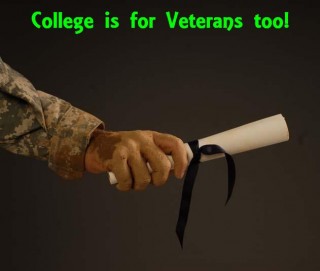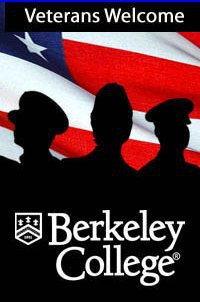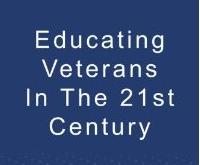 One area that VT has not given enough attention to is Veterans going to college.
One area that VT has not given enough attention to is Veterans going to college.
College is for Veterans Too!
There have been increasing numbers of Veterans who wish to continue their college education or use their Post 911 GI Bill benefits to be the first in their family to go to college. There tends to be something unique about this generation of younger Veterans that sets them a bit apart from previous generations.
Despite horror stories to the contrary that the enlisted ranks are composed of the poor and children of low income families, and yes there is no doubting that we do have an economic draft in this country. I personally feel that this generation of Veterans is better educated than mine, and this goes beyond being computer literate at birth.
Another aspect that sets them apart from my generation is the overuse, abuse, and exploitation of the Army National Guard in order for the Pentagon to avoid bugging politicians to implement the draft. Unlike the National Guard of my Vietnam generation, joining the Guard today is nothing like the sanctuary from combat, and haven for rich white boys, to avoid serving in Vietnam.
Since 911, the number of National Guard troops deployed in harms way has been significant. When we look at the Guard compared to Regular troops note that ‘educational assistance,’ was and remains the primary carrot held out by the Army National Guard to attract recruits. The point I’m raising here is that not only are former National Guard and Reserve troops taking advantage of the educational carrot, but so are those young people who volunteered for the Regular Army or Marines. However, the concern remains are these young Veterans smoothly adapting to a transition from Veterans to college students regardless if they attended college prior to multiple deployments or not.
College Educators for Veterans Higher Education Inc., (CEVHE) was formed to address these concerns. Dr. Douglas Herrmann,a founding member of CEVHE, has granted VT permission to republish their article, College Is for Veterans, Too [below] that appeared in The Chronicle of Higher Education Volume 55, Issue 13, Page A99. The Chronicle article was published on Veterans Day, 11 Nov 2008 to deliberately call attention to the article.
As a Veteran who took advantage of the Vietnam Era GI Bill to be the first in my family to attend college and return to active duty, I take a personal interest in how our younger Vets are doing today in their quest for higher education.
Robert L. Hanafin, Major, U.S. Air Force-Retired, GS-14, U.S. Civil Service-Retired, Veterans Issues Editor, VT News Network
Three Former Service Members Explain How Colleges Can Help Student Veterans
By DOUGLAS HERRMANN, DOUGLAS RAYBECK, and ROLAND WILSON
[During the summer of 2008] Congress passed the new GI Bill, and the president signed it into law. Americans can take great pride in such a program, one that helps veterans attend college after they return home. However, few are aware that many of those veterans will also encounter a variety of non-financial problems that require substantial adjustment as they make the transition from military to college life.
Since the last great wave of veterans attended college, following the Vietnam War, there have been many changes in college administrative procedures, educational requirements, and American culture. As a result, college officials and professors are often unprepared to help new veterans cope with problems concerning financial aid, transfer credits, educational programs, health care, and classroom dynamics. Colleges need to adopt new administrative and educational practices to help veterans obtain the college education they have earned.
Special Challenges Faced by Veterans on Campus
While veterans, like all students, attend lectures, complete assignments, write term papers, and take exams, they face some special challenges. On some campuses, for instance, veterans will find that, in their first year, it can take a while – typically about three months – for the Veterans Administration to deliver their GI Bill funds. Colleges should not require veterans to pay for their tuition and fees until the GI Bill check arrives, but should instead provide veterans with financial support for the living expenses for themselves and their families, or identify charities that could provide such support. At the very least, colleges should find ways to help veterans obtain loans for the cost of living. For example, colleges could develop institutional loans, arrange for college cost-of-living loans with local banks, and possibly lobby for federal loans with low fixed-interest rates. A common frustration for student veterans is the denial of academic credit for military training and experience that correspond to the content of their college courses.
After World War II, the American Council on Education established a system to transfer military credits to college records, and decisions about what and how many credits ought to be granted have been left to the wisdom of academic-affairs offices. Unfortunately, staff members in those offices have often not been trained in how to award transfer credits and, as a result, mistakenly reject some requests. Proper training on awarding military credits fairly and efficiently should be encouraged so that veterans aren’t wrongfully deprived of credits they have earned. Repeating course work forces them to take more courses than necessary and stay in college longer to complete their degrees (which, of course, means more loans).
Another problem for veterans is that many college programs fail to meet, or even acknowledge, their personal and academic needs. For example, orientation programs deal with the concerns of traditional students, but not those of many veterans – most of whom are older and many of whom are married. Further, veterans often possess a specialty acquired in the military that they would like to build upon through additional course work in a specific subject, like electronic communication or law enforcement. Offering them the flexibility of online or evening courses might prove helpful. Internships and work study programs that build on the veterans’ experience and knowledge could also save them time, money, and potentially years of extra study.
Health services for both physical and mental illnesses are another area of concern for returning veterans. College health services are often unprepared to help veterans with emergency care for disabilities, illnesses, and disorders they acquired in the military. Some of those disabilities may not emerge until a veteran is in college; for example, many of today’s veterans will eventually experience post-traumatic stress disorders, a condition that many college health services are not prepared to diagnose, treat, or refer for appropriate treatment. Campus health services should, in conjunction with VA medical centers, help provide veterans with the care they need.
 Finally, a word about classroom and campus climate. [VT Editorial Comment: Although most colleges WELCOME the attendance of Military Veterans due to the maturity, insights, and financial assistance they bring to the colleges,] Dr. Herrmann and colleagues’ noted that some professors make pejorative [anti-war] statements about the military during lectures, making veterans feel uncomfortable and setting them further apart from their classmates. Of course, most professors aren’t trying to make veterans feel uncomfortable – their objective is usually to voice disagreement with government policy or to stir up discussion in class – but they should be mindful of the negative effects on veterans, and lead more-balanced discussions of the military and its role in society.
Finally, a word about classroom and campus climate. [VT Editorial Comment: Although most colleges WELCOME the attendance of Military Veterans due to the maturity, insights, and financial assistance they bring to the colleges,] Dr. Herrmann and colleagues’ noted that some professors make pejorative [anti-war] statements about the military during lectures, making veterans feel uncomfortable and setting them further apart from their classmates. Of course, most professors aren’t trying to make veterans feel uncomfortable – their objective is usually to voice disagreement with government policy or to stir up discussion in class – but they should be mindful of the negative effects on veterans, and lead more-balanced discussions of the military and its role in society.
Further, students who vilify or harass veterans should be disciplined firmly, as they would for harassing any other student (veterans are occasionally singled out for verbal attacks on some campuses). To help veterans integrate and other students to get to know them, colleges could sponsor social gatherings, or veterans could speak to various campus organizations and student groups about what they learned in the military and their experiences abroad.
Offering meaningful assistance to returning veterans may be as simple as making the dean of students’ office aware of veterans’ concerns and promoting their integration with other students. And a major new effort announced this week by the American Council on Education – which will, among other things, reward higher-education institutions that have model programs for veterans and develop a Web site that gives veterans information about educational benefits and opportunities – should play an important role in helping service members attend and succeed in college.
There is a widespread lack of knowledge about the unique needs of veterans in higher education and the wider society, and too few veterans obtain a college degree. College administrators and professors must update programs and services to better accommodate and support the large number of veterans returning to campus. The vast majority of America’s educators want as many veterans as possible to complete a college education, so let’s take the necessary steps required to help them reach their well-deserved goal.
Douglas Herrmann is emeritus professor of psychology at Indiana State University and a Marine veteran of Vietnam; Douglas Raybeck is an emeritus professor of anthropology at Hamilton College and was a Vietnam War protester; and Roland Wilson, retired from the Marines, is a recent graduate of Indiana State University. Bertram S. Allen Jr., a professor of psychology at Milligan College and an Army veteran of Vietnam, and Charles Hopkins, an emeritus professor of education at Indiana State University and an Army veteran of World War II, contributed to this article.
VT Editorial Comment: We at VT have been asked to read and review several articles and books that have been written on the subject of integrating Veterans into the academic community. We will be looking at aspects from health concerns to discrimination against Veterans on campus.
That said, just as professors and non-Veteran students need to be sensitive to the role played by Veterans in our society, they need to understand that Veterans have just as many diverse views on political decisions made by our government to commit only a small percentage of our youthful population to wars.
In turn, Veterans must realize that despite propaganda to the contrary, America is not at war, we have NO DRAFT, and the decision to join the Armed Forces was a free decision. Though Vets should not stand for being discriminated against, they must be sensitive to the fact that less than 3% of our population can relate to the military, and even less than that serve.
The nation is not at war, only those who exercise the freedom of choice to join the Armed Forces are at war, but we should never be blamed for the frustrations others feel about our civilian governments inability to end the wars. Nothing could bring together Veterans of diverse political views quicker than discrimination against ALL of US be it on a college campus, seeking employment, or for what our political views are.
Robert L. Hanafin, Major, U.S. Air Force-Retired, GS-14, U.S. Civil Service-Retired, Veterans Issues Editor, VT News Network. First in my family to attend college.
Readers are more than welcome to use the articles I’ve posted on Veterans Today, I’ve had to take a break from VT as Veterans Issues and Peace Activism Editor and staff writer due to personal medical reasons in our military family that take away too much time needed to properly express future stories or respond to readers in a timely manner.
My association with VT since its founding in 2004 has been a very rewarding experience for me.
Retired from both the Air Force and Civil Service. Went in the regular Army at 17 during Vietnam (1968), stayed in the Army Reserve to complete my eight year commitment in 1976. Served in Air Defense Artillery, and a Mechanized Infantry Division (4MID) at Fort Carson, Co. Used the GI Bill to go to college, worked full time at the VA, and non-scholarship Air Force 2-Year ROTC program for prior service military. Commissioned in the Air Force in 1977. Served as a Military Intelligence Officer from 1977 to 1994. Upon retirement I entered retail drugstore management training with Safeway Drugs Stores in California. Retail Sales Management was not my cup of tea, so I applied my former U.S. Civil Service status with the VA to get my foot in the door at the Justice Department, and later Department of the Navy retiring with disability from the Civil Service in 2000.
I’ve been with Veterans Today since the site originated. I’m now on the Editorial Board. I was also on the Editorial Board of Our Troops News Ladder another progressive leaning Veterans and Military Family news clearing house.
I remain married for over 45 years. I am both a Vietnam Era and Gulf War Veteran. I served on Okinawa and Fort Carson, Colorado during Vietnam and in the Office of the Air Force Inspector General at Norton AFB, CA during Desert Storm. I retired from the Air Force in 1994 having worked on the Air Staff and Defense Intelligence Agency at the Pentagon.
ATTENTION READERS
We See The World From All Sides and Want YOU To Be Fully InformedIn fact, intentional disinformation is a disgraceful scourge in media today. So to assuage any possible errant incorrect information posted herein, we strongly encourage you to seek corroboration from other non-VT sources before forming an educated opinion.
About VT - Policies & Disclosures - Comment Policy





